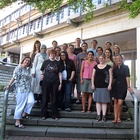I first came into contact with Toshio Mori’s works in the “Japanese Americans” seminar I attended this summer term at the University of Wuppertal. What I enjoyed most about Mori’s short stories was that they gave quite brief, but nonetheless vivid and fair, accounts of life in Japanese American society before WW II and during the Japanese internment. At that time, the first generation of Japanese immigrants, or Issei, and the second generation, or Nisei, lived predominantly in communities on the West Coast. The short story that fascinated me the most was "The Trees."
The plot is quite short. There are two men, Hashimoto and Fukushima, who are going for a walk in a garden with pine trees. Hashimoto appears to be a normal gardener who is satisfied with what he has—namely, going for a walk among the pine trees every morning—whereas Fukushima once owned large properties and stocks, but unfortunately lost everything.
Fukushima asks Hashimoto to tell him his secret of happiness, which he expects has to do with the trees. Hashimoto tells him, however, that there is nothing in those trees but that he should notice that he is now warm and not freezing as before. But Fukushima does not pay attention and insists on Hashimoto telling him his secret. Hashimoto tries again to tell him he should notice that, as they walked along, he became warm. But Fukushima gets angry and tells him that he will go and leave forever, and that one day Hashimoto can visit him in the mental hospital in Stockton, CA. Finally, Fukushima leaves and Hashimoto cries after him.
What fascinated me most about this short story was the fact that those two people were apparently unable to communicate with each other because they had completely different lifestyles. Fukushima is a prototypical example of a Japanese American who adapted the western lifestyle, lived the American Dream, adopted capitalist values, and equates wealth with happiness. Hashimoto, on the other hand, represents old traditional Japanese values including Buddhism.
Thus both men have two completely different concepts of life but are nonetheless part of the same community. This represents a general conflict in Japanese American society between Issei and Nisei: how to define oneself as Japanese American in this country, not breaking with Japanese traditions but also adapting to American society. But this story expresses more than this conflict; it expresses people’s general need for individual satisfaction and happiness. Here, Fukushima sought happiness in material wealth while Hashimoto did not. He sought it in Buddhism and consequently in spiritual self-discovery. Hence this story displays not solely a conflict within Japanese American society, but a conflict which is omnipresent in our western society as well.
There are people everywhere who are leading their lives always searching for personal satisfaction and happiness, yet, like Hashimoto who appears to be so in peace with himself, cannot always be happy. He is “warm and cold too”, thus it becomes quite plain that one can never arrive at a state where everything is fine in life. I think that Fukushima tries to make the matter quite a bit too easy by going straight to Hashimoto, asking for his secret of happiness and expecting that he can get it as fast and easy, as you get your menu in a fast-food restaurant. Hashimoto’s response and Fukushima’s inability to understand it, however, show that things are not that easy.
Even in the Bible, a similar topic is presented in the book of Job where Satan tries Job by destroying everything he owns: his stocks, his house, and even his wife and children. But even in this misery, Job does not lose his faith in God, and God rewards him for it. In “The Trees,” Fukushima suffers from a misery similar to Job’s but he is unable to cope with his misery as he has no belief or anything else that could bring him up again.
One need not be as faithful as Job nor Hashimoto but I think that, apart from religion, Mori’s short story as well as the Book of Job make clear how important it is not to rely too much on material things. They both tell us how important it is to note that everything is vain and that we should have other things to hold us on earth like personal relationships; religion or faith of any kind; or simply the ability to take things easy and to have a break, if it is necessary.
So that consequently we can be aware of the instability of our lives and our environment, take the world as it is, and have to try to cope with setbacks of any kind.
© 2010 Bjoern Koeller



